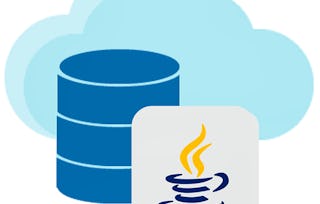Il s'agit du quatrième cours du certificat professionnel Amazon Junior Software Developer. Dans ce cours sur l'introduction aux bases de données et aux requêtes SQL de base, vous apprendrez les connaissances et les compétences essentielles pour travailler avec des bases de données relationnelles et interroger des données à l'aide du langage SQL (Langage de requête structuré). Vous commencerez par comprendre les concepts fondamentaux tels que les tableaux, les lignes et les colonnes et apprendrez à écrire des requêtes SQL de base pour des opérations telles que la sélection, l'insertion, la mise à jour et la suppression de données. Vous interagirez avec la ligne de commande pour créer, alimenter et interroger une base de données simple. En passant aux requêtes SQL, vous explorerez des sujets avancés, notamment la récupération de données à partir de plusieurs tables à l'aide de JOIN, le filtrage de données à l'aide de clauses WHERE et le tri/regroupement de données à l'aide des clauses ORDER BY et GROUP BY, ce qui permet une manipulation efficace des données dans les bases de données. Ensuite, vous vous plongerez dans les principes fondamentaux de JDBC, en acquérant des connaissances sur JDBC (Java Database Connectivity), en configurant des pilotes et des connexions JDBC, en exécutant des requêtes et des commandes SQL avec des instructions JDBC, en établissant des connexions de base de données à l'aide de DriverManager et de DataSource, en gérant efficacement les connexions de base de données et en exécutant des instructions DDL et DML pour la gestion des schémas de base de données et la manipulation des données. A la fin de ce cours, vous saurez travailler avec des bases de données, écrire des requêtes SQL et utiliser JDBC pour interagir avec des bases de données dans des applications Java. A l'issue de ce cours, vous serez capable de :

Gestion de bases de données avec Java et SQL

Gestion de bases de données avec Java et SQL
Ce cours fait partie de Développeur logiciel junior Amazon Certificat Professionnel

Instructeur : Amazon
6 309 déjà inscrits
Inclus avec
35 reviews
Expérience recommandée
Ce que vous apprendrez
Discuter des différents types de configurations de bases de données courantes.
Manipuler des ensembles de données à l'aide d'outils et de techniques de programmation Java.
Illustrer le processus d'interrogation et d'extraction de données en cours d'utilisation SQL avec JDBC.
Compétences que vous acquerrez
- Catégorie : Langage de requête
- Catégorie : Composants UI
- Catégorie : Bases de données relationnelles
- Catégorie : Systèmes de base de données
- Catégorie : Programmation Java
- Catégorie : Interface utilisateur (UI)
- Catégorie : Accès aux données
- Catégorie : MySQL
- Catégorie : Conception de la base de données
- Catégorie : Base de données
- Catégorie : Gestion des bases de données
- Catégorie : SQL
- Catégorie : Développement de logiciels
- Catégorie : Bases de données
- Catégorie : Traitement des transactions
- Catégorie : Java
- Catégorie : Application de base de données
Détails à connaître

Ajouter à votre profil LinkedIn
13 devoirs
Découvrez comment les employés des entreprises prestigieuses maîtrisent des compétences recherchées

Élaborez votre expertise en Développement de logiciels
- Apprenez de nouveaux concepts auprès d'experts du secteur
- Acquérez une compréhension de base d'un sujet ou d'un outil
- Développez des compétences professionnelles avec des projets pratiques
- Obtenez un certificat professionnel partageable auprès de Amazon

Il y a 4 modules dans ce cours
Ce module pose les bases de la compréhension et de l'utilisation des bases de données. Il couvre les principes fondamentaux des systèmes de bases de données, y compris les structures des tables, les types de données et les relations. Vous apprendrez les compétences SQL essentielles pour l'interrogation et la manipulation des données, en commençant par les filtres de base et en progressant vers des opérations plus complexes telles que le tri et l'agrégation. Le module explore ensuite diverses techniques de jointure, vous apprenant à combiner efficacement des informations provenant de plusieurs tables. Grâce à un mélange de concepts théoriques et d'activités pratiques, vous acquerrez une expérience pratique de la création de bases de données, de l'interrogation et de l'extraction de données. À la fin de ce module, vous aurez acquis une solide maîtrise des principes de base des bases de données et des opérations SQL, ce qui vous préparera à aborder des concepts de base de données plus avancés plus tard dans le cours.
Inclus
18 vidéos10 lectures4 devoirs4 laboratoires non notés
Dans ce module, vous découvrirez comment connecter des applications Java à des bases de données à l'aide de JDBC, en commençant par les bases de l'architecture JDBC et la manière d'établir votre première connexion à une base de données à partir de Java. Vous apprendrez à configurer votre environnement, à charger les pilotes et à établir des connexions. Vous vous plongerez également dans la gestion des connexions, en abordant des techniques pratiques telles que l'utilisation de DataSource et la gestion des cycles de vie des connexions. Au fur et à mesure de votre progression, vous explorerez également le travail avec le langage de définition des données (DDL) et le langage de manipulation des données (DML), en apprenant à créer, modifier et supprimer des tables, et à gérer les transactions comme un professionnel. Grâce à des activités interactives et des exercices pratiques, vous développerez les compétences nécessaires pour écrire du code Java qui interagit en douceur avec les bases de données, ce qui vous permettra de créer des applications puissantes, alimentées par des bases de données.
Inclus
15 vidéos8 lectures4 devoirs1 devoir de programmation4 laboratoires non notés
Dans ce module, vous allez vous plonger dans la construction d'interfaces utilisateur graphiques (IUG) pour les applications de base de données à l'aide de JavaFX. Vous commencerez par mettre en place des projets et créer des IUG de base, en vous familiarisant avec la gestion des événements. Ensuite, vous connecterez vos applications JavaFX aux bases de données, en apprenant à récupérer et à afficher les données en douceur. Vous aborderez également la gestion des erreurs pour les opérations de base de données. Au fur et à mesure de votre progression, vous explorerez des techniques d'UI avancées telles que l'utilisation de SceneBuilder pour la conception, la liaison de données et l'ajout de fonctionnalités telles que la recherche. À la fin du cours, vous serez en mesure de créer en toute confiance des applications Java interactives et alimentées par des bases de données.
Inclus
12 vidéos4 lectures4 devoirs1 devoir de programmation4 laboratoires non notés
Dans ce dernier module, vous réunirez tous les éléments du cours pour créer un système de gestion de bibliothèque qui constituera votre projet de référence. Vous acquerrez une expérience pratique en intégrant la conception d'une base de données, SQL, la programmation Java et JavaFX pour créer une application complète. En cours de route, vous réfléchirez à votre apprentissage par le biais d'une auto-évaluation et d'un quiz final, ce qui vous aidera à renforcer les concepts clés. Vous vous tournerez également vers l'avenir pour explorer les prochaines étapes potentielles de votre parcours en gestion de bases de données et en programmation Java, préparant ainsi le terrain pour une croissance future.
Inclus
2 vidéos2 lectures1 devoir1 devoir de programmation
Obtenez un certificat professionnel
Ajoutez ce titre à votre profil LinkedIn, à votre curriculum vitae ou à votre CV. Partagez-le sur les médias sociaux et dans votre évaluation des performances.
En savoir plus sur Développement de logiciels
 Statut : Essai gratuit
Statut : Essai gratuitLearnQuest
 Statut : Essai gratuit
Statut : Essai gratuit Statut : Prévisualisation
Statut : Prévisualisation Statut : Essai gratuit
Statut : Essai gratuit
Pour quelles raisons les étudiants sur Coursera nous choisissent-ils pour leur carrière ?

Felipe M.

Jennifer J.

Larry W.

Chaitanya A.
Avis des étudiants
- 5 stars
65,71 %
- 4 stars
20 %
- 3 stars
0 %
- 2 stars
11,42 %
- 1 star
2,85 %
Affichage de 3 sur 35
Révisé le 12 août 2025
Objective directions. Good quality materials and hands-on labs.
Révisé le 31 janv. 2025
The journey was amazing and I have learned a lots of thing . learned about problem solving . its never coding its how you think to solve the problem
Révisé le 23 févr. 2025
JavaFX module is a bit confusing, but overall a good course

Ouvrez de nouvelles portes avec Coursera Plus
Accès illimité à 10,000+ cours de niveau international, projets pratiques et programmes de certification prêts à l'emploi - tous inclus dans votre abonnement.
Faites progresser votre carrière avec un diplôme en ligne
Obtenez un diplôme auprès d’universités de renommée mondiale - 100 % en ligne
Rejoignez plus de 3 400 entreprises mondiales qui ont choisi Coursera pour les affaires
Améliorez les compétences de vos employés pour exceller dans l’économie numérique
Foire Aux Questions
Ce certificat professionnel est conçu pour les développeurs de logiciels juniors qui cherchent à lancer leur carrière dans l'industrie technologique. Il s'adresse également aux professionnels actuels qui cherchent à mieux comprendre les principes fondamentaux du développement de logiciels.
Ce programme est fait pour vous :
- Si vous êtes intéressé par le domaine du développement de logiciels ou si vous commencez à travailler dans des fonctions de développement de logiciels juniors.
- Si vous voulez changer ou commencer une carrière dans le domaine du développement de logiciels
- Si vous travaillez déjà dans le domaine du développement de logiciels et que vous cherchez à mieux comprendre les principes fondamentaux du développement de logiciels, l'obtention d'un certificat de développement de logiciels Amazon peut vous aider à faire progresser votre carrière ou à combler vos lacunes en matière de connaissances, de compétences et d'aptitudes.
Une expérience préalable en matière de codage est souhaitable, mais elle n'est pas obligatoire. Une compréhension de base des concepts de programmation et une volonté d'apprendre sont recommandées.
Le principal avantage réside dans l'acquisition de compétences pratiques et de connaissances essentielles pour lancer une carrière de développeur de logiciels junior. Ce certificat professionnel vous permet non seulement d'acquérir l'expertise nécessaire pour occuper un poste de débutant, mais aussi d'obtenir une certification reconnue, ce qui renforce votre crédibilité au sein de l'industrie. Ce certificat offre des expériences d'apprentissage pratiques sous la direction de professionnels chevronnés.
Un développeur de logiciels junior prend généralement en charge la conception, le développement et la maintenance des applications logicielles tout en recevant des conseils de développeurs seniors, ce qui en fait des candidats appropriés pour des stages ou des apprentissages.
Plus de questions
Aide financière disponible,

